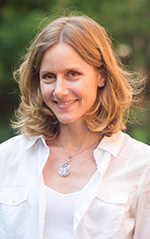The Last Assignment: Moving into Retirement
Deciding where to settle in retirement, and making it happen, is not easy. Here are tips from some who have successfully navigated this process.
BY DONNA SCARAMASTRA GORMAN
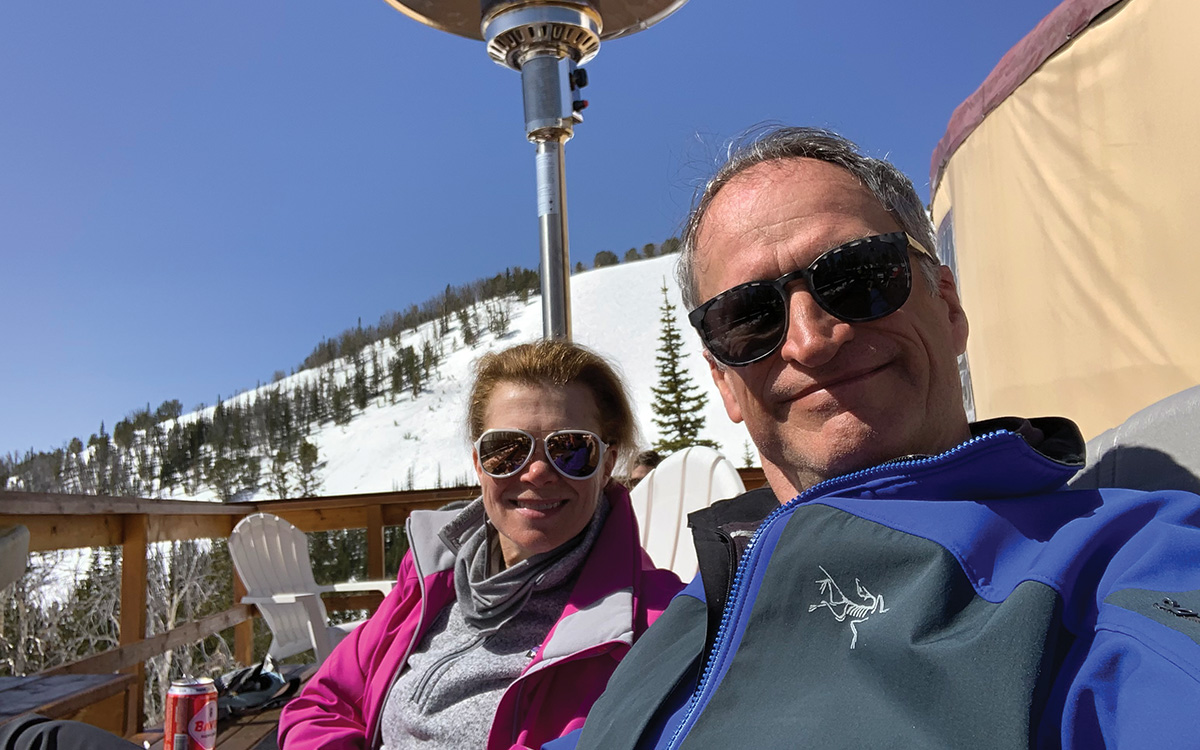
Kurt and KC Rice hit the ski slopes in Montana.
Courtesy of Kurt Rice
You’ve put in your 20 years—or more. You’ve saved the maximum in your Thrift Savings Plan. You’ve collected challenge coins in a dozen countries across the globe. You’ve spent way too many hours on international flights to places most people have never heard of. It’s finally time. Time to retire and find a forever home where you can display all those carpets and tchotchkes that have been moving with you from post to post.
But is it really time? And if it is, where are you going to go?
Many Foreign Service members describe themselves as rootless. Or, if they’re tied to a specific geographical location, it’s one in which they haven’t lived in decades. Deciding where to put down roots after a life on the move can be one of the biggest challenges a Foreign Service family will ever face. We talked to current retirees to find out how they decided where to live after leaving the Foreign Service, and how they made it happen.
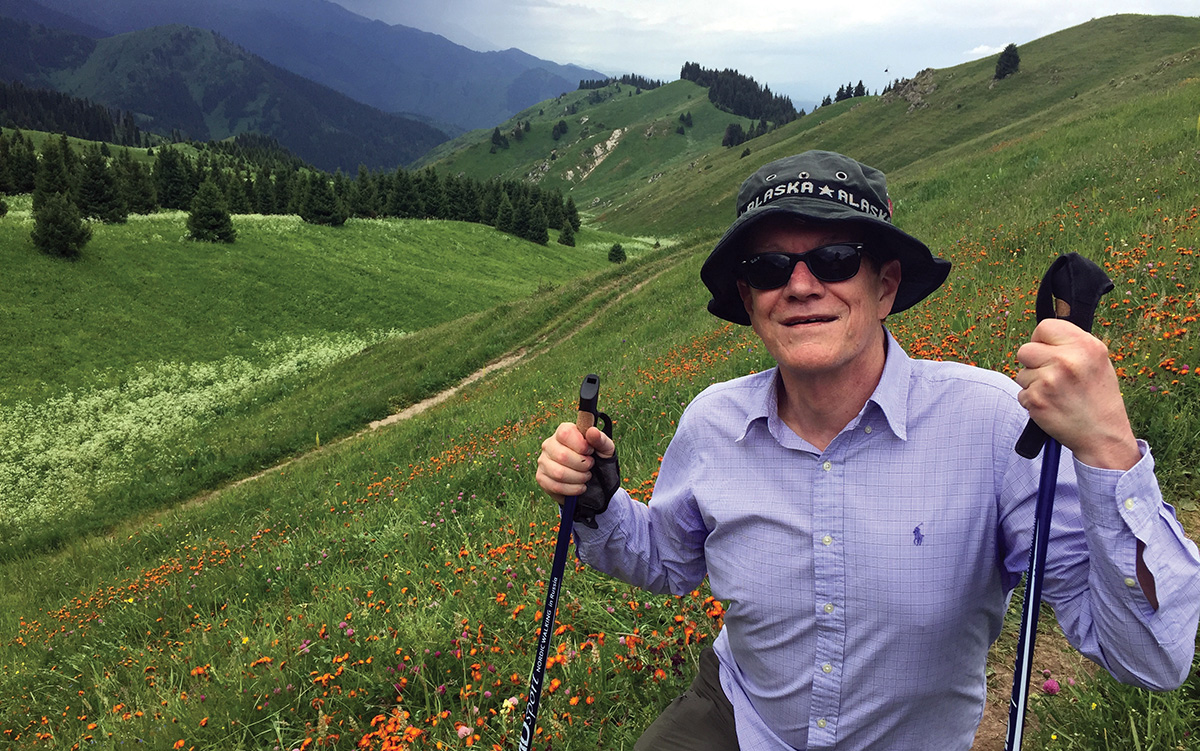
Ambassador John Ordway hiking in California.
Courtesy of John Ordway
Make a List
Moving into Mom’s Place
Mt. Hood, Oregon
She spent every home leave at her parents’ place in Mt. Hood and loved it, says FSO (ret.) Elizabeth Marker, even dreaming “in a vague way” of one day living there. After her dad died, her mom grew tired of taking care of the property on her own, so Elizabeth and her husband, an avid gardener, bought the house and attached orchard—about 14 acres total.
The orchard is leased out, and Elizabeth enjoys being “part of the food chain, feeding the world cherries and pears.” Retirement is more expensive than Elizabeth anticipated, but her husband works at a nearby hardware store, which helps. And anyway, she says, “all the evaluations of taxes, benefits and nearby services didn’t really figure into the decision; being able to work this place and be close enough to my mom to have lunch is what mattered to me.”
Elizabeth advises other retirees to take their time settling in. “The burnout we all feel is real,” she says. She retired eight months ago and is still too busy unpacking and digging in her garden to even think about re-employed annuitant work.
What does a good retirement look like to you? Make a list of everything you think you might want. Sunshine? Snow? A nearby shopping mall? Easy access to hospitals, theaters or international cuisine? This list can help you narrow down rough geographical areas to consider.
Retired FS Specialist Peter Kennett says the list that he and his wife developed included things like quality medical care, good weather, culture, cuisine and a low local cost of living—all of which eventually led them to New Mexico. Peter has become an expert astrophotographer, with his own backyard observatory, and he and his wife harvest honey and raise chickens on their ranch.
Jim Jessee, a Foreign Service specialist, and his spouse, Mary, plan to retire next year. They wanted “a strong Asian community and an active lifestyle” when they chose Chandler, Arizona. They have friends and family in the area and say “it’s close to California without the taxes.” Their house is currently rented through a national home management company, but the couple looks forward to settling there in 2023.
Former FSO Ali Jalili was looking for a smaller city with access to cultural amenities, a walkable downtown, shops and restaurants. A friend suggested Burlington, Vermont, and it checked all the boxes. It had everything on his list, plus “a convenient small airport, a great teaching hospital, a progressive vibe, a spectacular natural setting on Lake Champlain, and easy access to all sorts of nature.”
Get Professional Help
Realtor Carolyn Connell, whose husband Ladd is a retired Foreign Service officer, has sold houses to and for FS retirees. She says the process of helping retirees choose a home is similar to helping first-time buyers. She recommends that both spouses make separate lists of everything that is important in a new town. They then combine their lists and work on prioritizing the items they’ve each listed. The list will change, she says, and that’s okay. “Something they don’t think is important will rise to the top. And when they fall in love with a place, they may realize something that was nonnegotiable isn’t there, and that’s okay with them.” Connell’s clients often want warm weather, no yard maintenance, a vibrant downtown, access to a major airport or a town with “likeminded people.”
How will you pay for this dream house of yours when it’s time? Connell recommends that you find out the average sales price in the area you’re dreaming of. If the down payment isn’t coming from the equity in your current home, she says, set a goal for what 25 percent of that price would be, and save it in a separate account.
Seeing Stars
New Mexico

The Horsehead Nebula as photographed by Peter Kennett.
Courtesy of Peter Kennett

One of Peter Kennett’s photos, the Spiral Nebula galaxy.
Peter Kennett
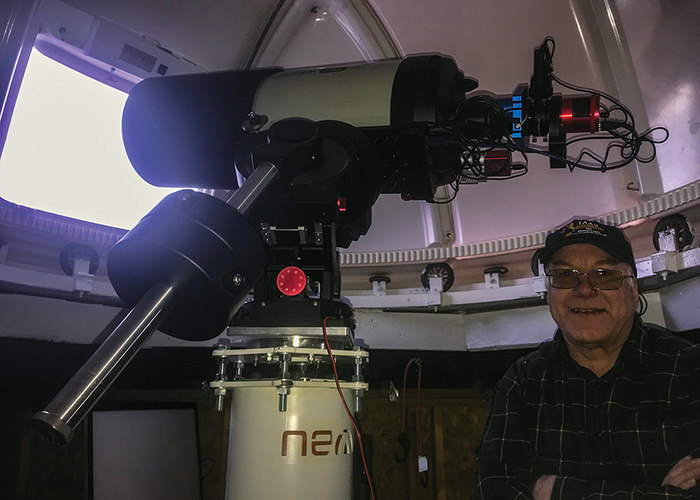
Astrophotographer Peter Kennett inside the observatory dome room he built on his property in rural New Mexico..
Peter Kennett
Five years before they retired, Peter Kennett and his wife, Megan, spent their home leave traveling across the United States, investigating possible retirement locations. They had a list of things they were searching for, including quality medical care, good weather, culture, cuisine and a low local cost of living. They also wanted a large tract of land in a dark rural area to accommodate Peter’s astrophotography hobby—he built his own observatory on the property, and now that he’s retired, he can stay up as late as he likes taking pictures of the stars.
Working with local Realtors, they scouted out four areas in New Mexico and found a solar-powered home on 15 acres, complete with chicken coop, an hour’s drive from the nearest skiing. They rented the house out while on their final assignment to Uganda. Peter reports that their current monthly cost of living, including their mortgage, is about one-third of their total pensions.
Peter is also an excellent photographer of things down here on Earth. His photo essay of a close encounter with a hippo in Uganda was the inaugural “Off-Road with the Foreign Service” feature in the January-February 2020 FSJ.
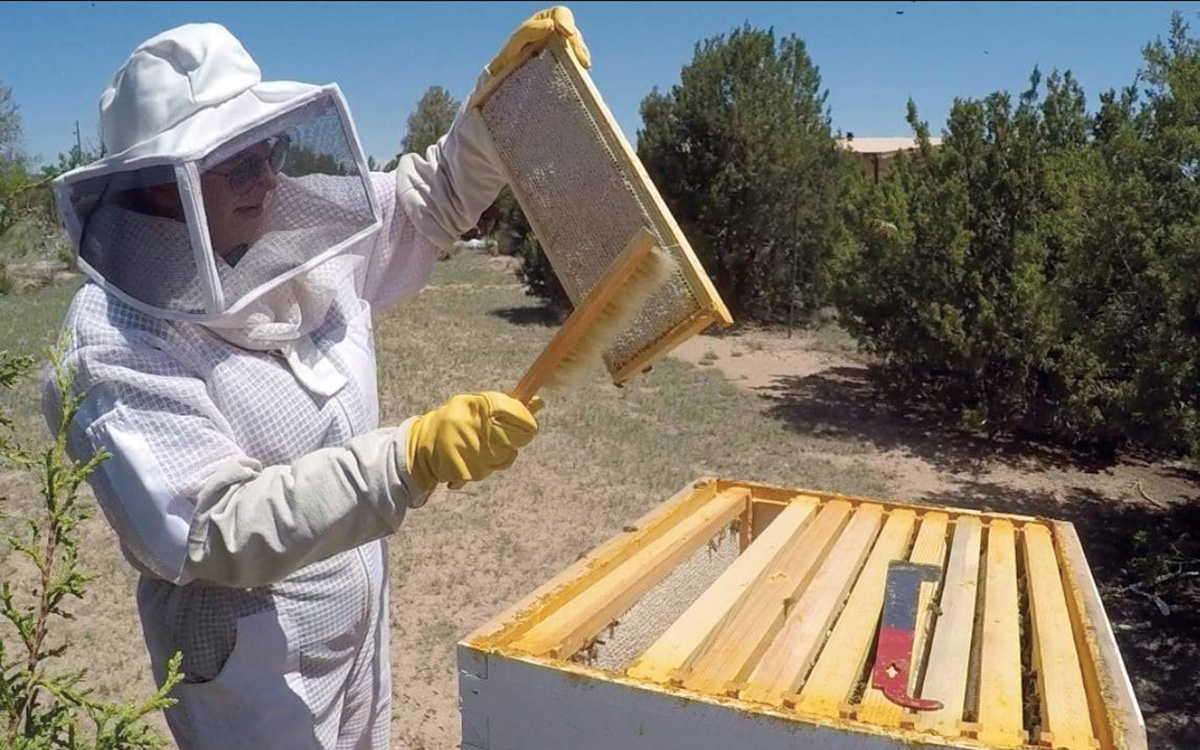
Megan Kennett at work beekeeping.
Peter Kennett
Crunch the Numbers
A Mild Climate
Monterey, California
Virginia Keener joined the Foreign Service straight from graduate school in Monterey, California, and always dreamed of retiring there. She watched real estate prices go up and feared she’d be priced out of the market, so when COVID-19 struck, she took advantage of the money she was able to save while stuck at home and used that money, along with funds from the sale of her house outside Baltimore, for a down payment on a house. She’s renting out the house in Monterey until next year, when she plans to retire after a 37-year career.
Monterey’s mild climate appeals to her, as does the fact that she’ll be close to family. She took out a 30-year mortgage on the house and doesn’t plan to find a post-retirement job—pension, TSP and Social Security will cover her costs.
There’s no magic number that will tell you when you can afford to retire, says Chris Cortese, a former Foreign Service officer who now owns Logbook Financial Planning. He looks carefully at each client’s financial situation, helping them plan out “cash flow for life” and looking at both their goals and their risk tolerance as he helps them decide if they can afford to make the leap into retirement. “A decision of that magnitude should be looked at by an objective third party,” says Cortese, who recommends working with a fee-only, fiduciary professional. (Check the National Association of Personal Financial Advisors at http://napfa.org or the XY Planning Network.)
To fund the purchase of a retirement home, Cortese says there are two main strategies. “One is to own a rental property or two that you purchased during your working career, then sell those to use the equity to launch into this next phase and buy your retirement dream home. The other strategy is to forgo real estate earlier in your career and invest in a well-diversified portfolio.”
Do you need to put more than 20 percent down on a home if you’re no longer working? Cortese recommends that rather than focusing on how much to put down on your home, you examine your total spending and liquidity in retirement. “The advantage of not having a mortgage is that you lower your fixed expenses, which gives you more flexibility in down markets,” he explains, but “if the majority of your withdrawals are flexible, like travel, entertainment or dining out, you can adapt more naturally” to market fluctuations, making a mortgage possible.
If you are retiring at an age where you cannot or should not yet access your TSP, Cortese recommends that you keep plenty of cash and investments in a taxable account at your disposal. “I would hesitate to put all my liquid savings into paying off the mortgage,” he says, as you need to first test out this new location to ensure it meets your needs. Having financial options, he says, is key to a successful retirement.
Put Down Roots Now
Retiring Overseas
Mexico City
When FSO Judith Bryan and her EFM husband started thinking about retirement, they made a list of places to consider, including several places in the United States, two in Europe and two in Mexico. Most of these locations were either places they’d been posted or places where they had friends and family. They planned to narrow down the list to four cities, put everything in storage when they retired and spend a year traveling, with a few months spent in each candidate city.
But six months before retiring, they attended a family destination wedding in central Mexico and stopped in Mexico City, where they’d been posted twice. When they returned home, says Judith, they “both admitted that our hearts were happy, and we felt at home in Mexico City.”
And that was that. It’s been more than four years, and they are still enjoying the “gorgeous weather, low cost of living, good health care, friendly people and interesting culture, and a good group of friends, both retired FS and locals.”
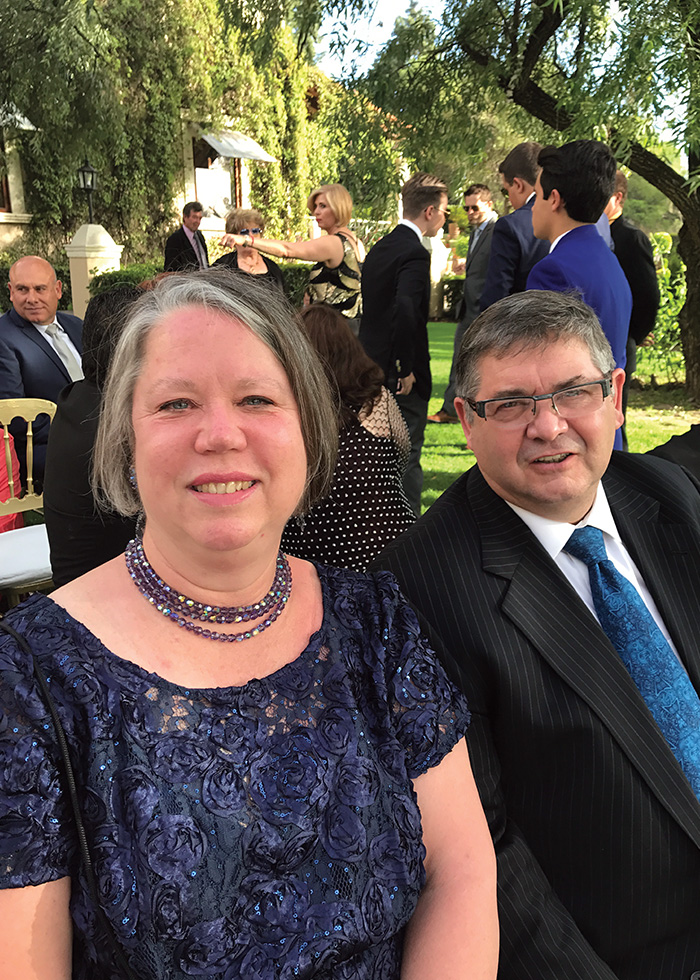
Judith Bryan and her husband, Daniel Bezol, at the family wedding in central Mexico that led to their decision to retire to Mexico City.
Courtesy of Judith Bryan
Several retirees recommended putting down roots before retirement, and even early in your career if possible. While on assignment in Ottawa, Ali Jalili and his spouse took the plunge and bought their “forever house” in Burlington, Vermont. The couple visited periodically and started to settle in, meeting other former Foreign Service members, as well as others “who are engaged in all sorts of different nongovernment, non-FS careers.” Jalili retired in 2020 and lived there throughout the pandemic. He’s now the trailing spouse in Sarajevo but plans to move to Burlington permanently after his wife retires.
Jack Dootzie, a retired FSO, and his spouse bought a house in the Colorado mountains when their children were young teens. “We wanted them to build strong ties to the mountain West,” he says, because that’s where the couple planned to retire in the future. They returned to the town for home leave and R&R trips, sending the kids to a nearby summer camp each year. Their kids now attend college in Colorado and use the family home as a “base camp” to gather with friends over breaks. “We’ve worked to build a community now that we can rely on when we retire.”
Ambassador (ret.) John Ordway’s family has been in California since the 1850s, so that’s where he wanted to live—near the cabin his parents built in the mountains 50 years ago. He and his wife, MaryJo, found a house not far from there and bought it while on a break from an assignment in Armenia. They used the proceeds from the sale of their Virginia home to pay for the new house, which they rented out until it was time to retire. He recommends putting down roots in a place early, especially if you have kids. “Find somewhere that feels like home, or at least ‘home-ish.’”
Visit During Multiple Seasons
Kurt Rice, a retired Diplomatic Security special agent and former deputy assistant secretary, and his wife, KC, a retired member of the Civil Service, started narrowing down their possibilities 10 years before retirement eligibility. They both love skiing, hiking and nature photography, so they were drawn to the mountain West; but with no extended family in the region, they had no specific place in mind. The couple began using their vacation time to visit various places that seemed to meet their requirements. Eventually they purchased a condo near a ski resort they enjoyed visiting in Montana, and six years later, they used that as a base to find their permanent retirement home in the area. Last year they started new jobs as ski hosts for the resort, which gets them ski passes and discounts on gear.
If at all possible, Kurt advises, travel extensively to the place you are thinking of moving, and do so in all seasons. “The brochure can be great,” he says, “but the reality, not so much.”
Chris Cortese concurs. “Visit during multiple seasons before you buy. Renting for a time in your new location can also be a good idea, depending on your situation (and if you can stomach another packout).”
While her job is to sell houses, Carolyn Connell recommends spending time in a place to see how it feels, perhaps even renting at first. It’s logistically possible to buy a place remotely, she says, but “I’ve had people retire to a place, hate it and come back.” Don’t be afraid to change your mind, or to test out a few places long-term until you decide what’s best for you.
Make a Plan
The most important thing is to start planning early. “You cannot and, except in rare, exceptional cases, should not try to work for the Mother Ship forever,” says Kurt Rice. It is incumbent upon each of us, he says, to plan for life after government service. “Having no plan can leave you trapped in a joyless situation,” he warns. And, he suggests, start developing hobbies and honing skills now, to prevent boredom later.
So get out your notepad and start mapping out your plan. It’s never too early to turn your dream into a roadmap. The only question is: Where do you want your map to take you?
Life on the Farm
Lopez Island, Washington
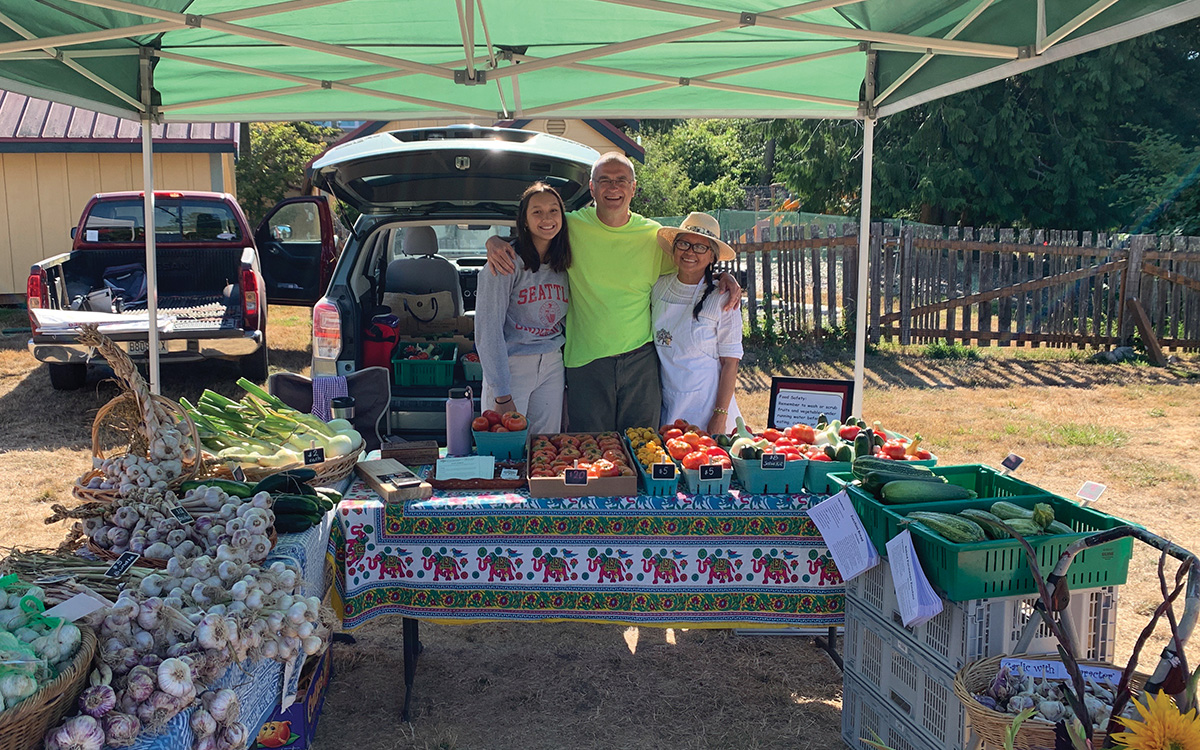
The Allen family at the local farmers market.
Courtesy of Mark Allen
Mark Allen was born in Seattle but moved frequently throughout his life. His wife, Dingdong, is from the Philippines, and the couple lived overseas until their daughter was 14, so finding a home in the United States was “complicated.” They began looking in rural Washington state and settled on Lopez Island when they noticed people waving hello as they drove by. “My parents are from rural Oklahoma,” says Mark. “I always loved how strangers would wave from their cars on the country roads between towns.”
They knew nothing about farming, but they began gardening and soon turned the property into a working farm. Dingdong’s Garden now sells fruits and vegetables at the local farmers market, along with cuttings and scionwood that they sell online.
“We live a more frugal life than when we had steady paychecks,” says Mark, but “in many ways our lives are much richer.” And, he notes, the ferry-served islands of Puget Sound have many part-time job opportunities, including for high schoolers like his daughter, Sophie.
The biggest shock wasn’t the transition from urban to rural, or from overseas to the United States. Rather, it was the fact that they had never been homeowners or worked with their hands. “We were paralyzed when we retired straight from New Delhi to our older home and overgrown property,” says Mark, but they attended the “University of YouTube” and learned how to roof the barn, put down flooring and plant an orchard.
Read More...
- “Retirement Planning 101,” by John K. Naland, FSJ, April 2020
- “AFSA Membership in Retirement: What’s in It for You?” by Dolores Brown, April 2020
- “10 Things I Wish I Had Known: Confessions of a Recent Retiree,” by Dolores Brown, FSJ, October 2018

